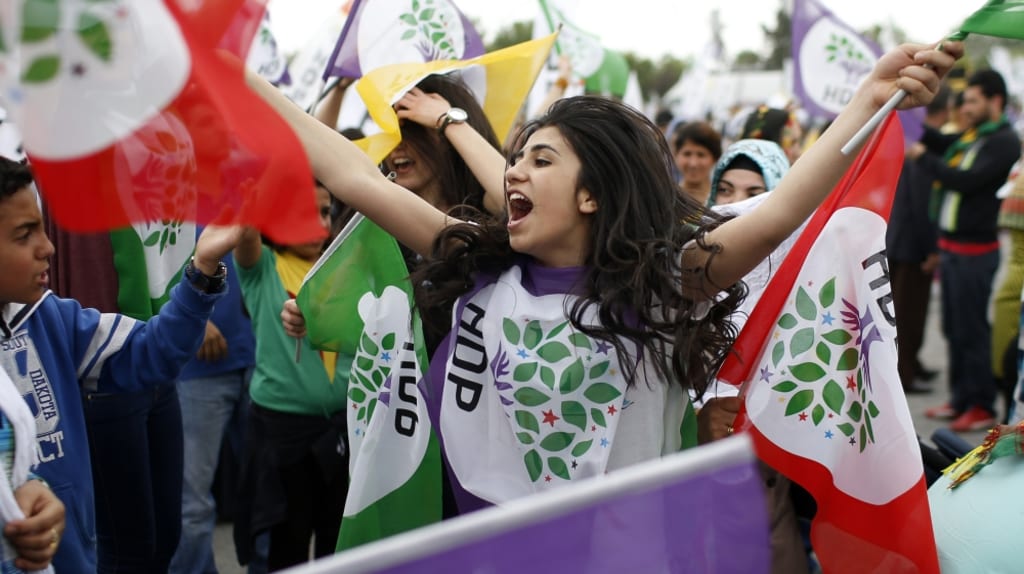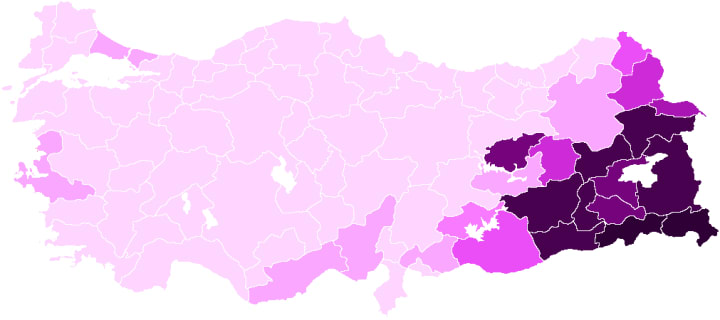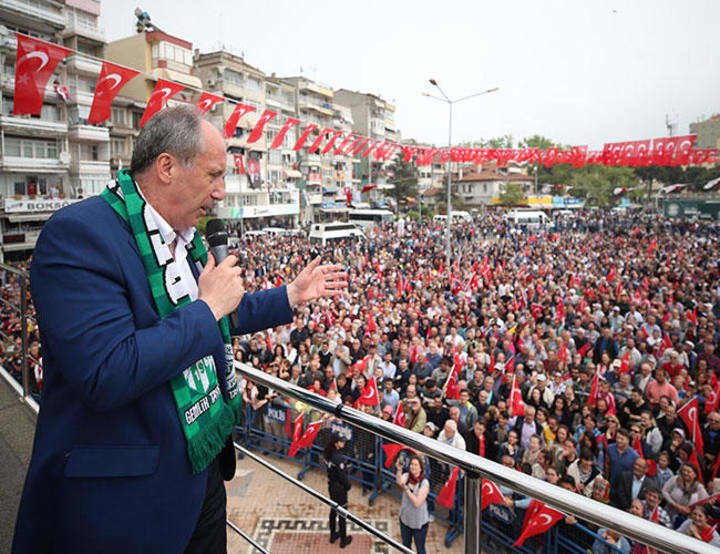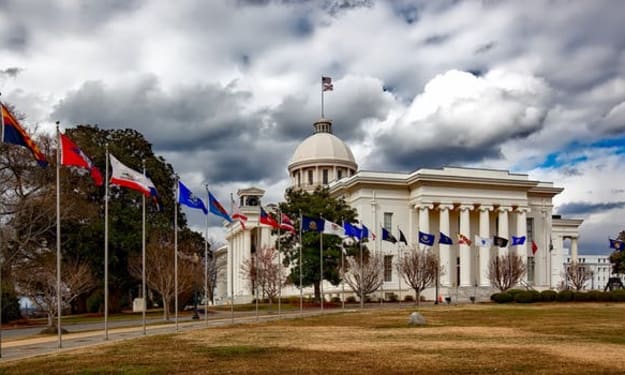The Rising Power of the Turkish Kurds
How a Historically Marginalised Group Is the Key to This Year's Presidential Election

In a country of almost 80 million, any Presidential candidate would be stupid to ignore 20 percent of their people. But that is what has happened to the Kurds in Turkey for decades. The Kurdish population, long ignored and marginalised by the political establishment, is now beginning to rise in importance. With Presidential and Parliamentary elections only six weeks away political organisations that have a long history of opposing or ignoring Kurdish rights and issues are suddenly finding themselves in need of their votes. What has changed? What would cause such a deeply nationalist country, led by an almost authoritarian President, to suddenly consider these people a viable support base.
The change began in 2012 with the creation of the People's Democratic Party (Halkların Demokratik Partisi, HDP), a left-wing organisation that grew out of the People's Democratic Congress (Halkların Demokratik Kongresi, HDK), a union formed from a variety of left-wing campaign groups, trade unions, and political parties, that is committed to minority rights and changing Turkish politics. Prior to the creation of the HDP the Kurds had been represented by a variety of different political organisations, however they were isolated and usually shut down due to their policy of Kurdish nationalism (something that is illegal in Turkey). The oldest still-active political representative for the Kurdish people in Turkey is the Kurdistan Workers Party (Partiya Karkerên Kurdistanê, PKK) a terrorist organisation whose leader, Abdullah Ocalan, is currently imprisoned.
Due to the nature of the Turkish electoral system, all parties are required to obtain 10% of the vote to have representation in the Grand National Assembly (the country's legislature), which meant that pro-Kurdish groups had to run as independents to win seats. However, in the 2014 Presidential election, Selahattin Demirtaş, the young charismatic co-leader of the HDP, ran for President and received 9.7 percent of the vote. This result, which was close to the 10 percen requirement, emboldened the party, and the next year their candidates ran as members of the party rather than independents and where rewarded with an increased 13% share of the vote and 80 seats. This made them an influential force in the subsequent hung assembly. And, although most of their support came for Kurdish majority regions, their candidates came from a variety of different ethnic, religious, and political traditions, including devout Muslims and LGBT activists. This lack of a unified Kurdish nationalism has made it difficult to attack the party as a supporter of the PKK.

HDP vote share by province in 2015
The support for the HDP, and the growth in the number of Kurds becoming more active in political organisations, is a growing trend across the region. Syrian Kurds have set up their own autonomous region during the country's civil war, while Iraqi Kurds voted for independence just last year. But this rise in Kurdish activity in Turkey has not come without cost. After the November 2015 election, in which the ruling Justice and Development Party (Adalet ve Kalkınma Partisi, AKP) managed to regain the majority they had lost a few months before hand, and the coup in 2016, has caused the government to break off peace talks between themselves and the PKK. They have also targeted the HDP itself, arresting its leaders and MP's in order to marginalise them like all other pro-Kurdish groups. This action just proves the threat President Erdoğan and others feel the Kurds pose in keeping them from power. The AKP even formed a coalition with the Nationalist Movement Party (Milliyetçi Hareket Partisi, MHP), an anti-solution far-right party known for its support of racists, in order to reform the constitution and grant Erdoğan greater powers as President. However, despite the constitutional reforms just passing in a referendum, this seems to have done more damage to the AKP than first thought. A section of the more liberal members of the MHP, led by Meral Akşener, broke away to oppose the reforms and the AKP, forming the liberal conservative Good Party (İyi Party, IYI). This breakaway, coupled with rising dissatisfaction with the AKP and MHP, has led to the greatest chance the opposition has had to take down Erdoğan since he became Prime Minister in 2002.
And this is where Kurdish power comes into it. Six candidates are running for the presidency: Incumbent President Recep Erdoğan (AKP), Meral Akşener (IYI), Muharrem İnce (Republican People's Party (Cumhuriyet Halk Partisi, CHP), a centre-left Kemalist party that is the largest opposition party), the imprisoned Selahattin Demirtaş (HDP), and two minor candidates for the Islamist Felicity Party and the far-left VATAN. Due to the wide selection of candidates from across the political spectrum, and the issues mentioned above, polling has consistently shown that Erdoğan would not win 50 percent forcing the election to go to a second round (the electoral system has the same two-round system as France), with both Akşener and İnce battling it out for second place. However, in third place, with a consistent 10-13 percent of the vote, is Demirtaş. His support base is large enough that they could win the second round for another candidate. This has forced the other campaigns to take notice of the Kurds and even try to attract them too, because if the Kurds fail to turn out after the candidate is eliminated in the second round then Erdoğan will win the election. So, the race is on to get the Kurdish second-round vote. Not to mention the support the support the HDP could give the Nation Alliance (a formed by the CHP, IYI, and other parties opposed to Erdoğan, but doesn't include the HDP) in the Assembly.

İnce speaking to supporters during the 2018 campaign
Muharrem İnce made headlines when he spoke of finding a solution to the Kurdish problem, and when he visited Demirtaş in prison calling for his release in the process. While Meral Akşener, despite her more nationalistic rhetoric, has made frequent campaign stops to Kurdish regions both before and during the campaign. With both campaigns attempting to elicit the support of the Kurdish voters, it seems the Kurds have gained an enormous amount of political power in a short time, able to make or break a political campaign (almost like Iowa voters, to use an American reference). Even Erdoğan's AKP has acknowledged the dangers the Kurds pose to them, with appointed governors travelling with military convoys to Kurdish regions to try and intimidate the Kurds into staying home or voting for President Erdoğan.
Although the Turkish state is falling further and further into authoritarianism, it seems that a sudden outburst of opposition from all corners of society might lead to Erdoğan and his AKP possibly losing power. But it can only be achieved if all facets of the opposition are united in getting rid of him. And this is what has forced both the CHP and IYI to woo Kurdish voters. Long marginalised by both parties and the establishment of Turkey, they seem to be the only chance of getting Erdoğan out of office and reversing his authoritarian changes. But it remains to be seen if the Kurds will buy what these parties are selling. The Kurds of Turkey have been down this road before though, candidates promise them freedom and peace, and end up reneging on their promises in order to keep power. Not too long ago the AKP was committed to peace with the PKK and liberation for the Kurds, but it all changed after they needed to scapegoat the group to win back power. But it doesn't matter if they turn out to vote in the second round, their power is undisputed, for their vote, or lack of voting, will swing this election one way or the other. And that is what shows that the Kurds are a rising power in the country.
About the Creator
Jack Holton
I'm an English dude who likes politics and fantasy, and sometimes they're combined and I go nuts. I'm also dating an American and like cake and dragons.






Comments
There are no comments for this story
Be the first to respond and start the conversation.